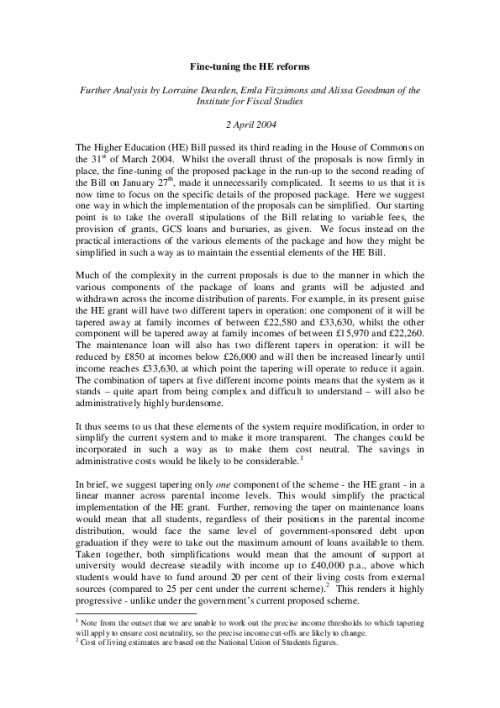Downloads

fine_tuning.pdf
PDF | 75.07 KB
The Higher Education (HE) Bill passed its third reading in the House of Commons on the 31st of March 2004. Whilst the overall thrust of the proposals is now firmly in place, the fine-tuning of the proposed package in the run-up to the second reading of the Bill on January 27th, made it unnecessarily complicated. It seems to us that it is now time to focus on the specific details of the proposed package. Here we suggest one way in which the implementation of the proposals can be simplified. Our starting point is to take the overall stipulations of the Bill relating to variable fees, the provision of grants, GCS loans and bursaries, as given. We focus instead on the practical interactions of the various elements of the package and how they might be simplified in such a way as to maintain the essential elements of the HE Bill.
Authors

Lorraine Dearden

Research Fellow University College London
Emla Fitzsimons is a Professor of Economics at the University College London Institute of Education and a Research Fellow at the IFS.

Research Fellow University College London
Alissa is an IFS Research Fellow and a Professor of Economics and Director of the Centre for Longitudinal Studies at the UCL Institute of Education.
Report details
- Publisher
- IFS
Suggested citation
L, Dearden and E, Fitzsimons and A, Goodman. (2004). Fine-tuning the HE reforms. London: IFS. Available at: https://ifs.org.uk/publications/fine-tuning-he-reforms (accessed: 30 June 2024).
More from IFS
Understand this issue

Election Special: The big issues politicians haven't spoken about
25 June 2024

Tough questions will face the election winners
10 June 2024

Election Special: The government's record on tax
10 June 2024
Policy analysis

How should we interpret parties’ public spending pledges this election?
23 June 2024

How would the parties’ tax and spending plans affect Scotland and Wales?
28 June 2024

Free breakfast clubs in schools: what Labour’s plans would mean for pupils and families
25 June 2024
Academic research

6th World Bank/IFS/ODI Public Finance Conference | Driving Progress: Public Finance and Structural Transformation

The intergenerational elasticity of earnings: Exploring the mechanisms
3 June 2024

Targeting men, women or both to reduce child marriage
28 May 2024